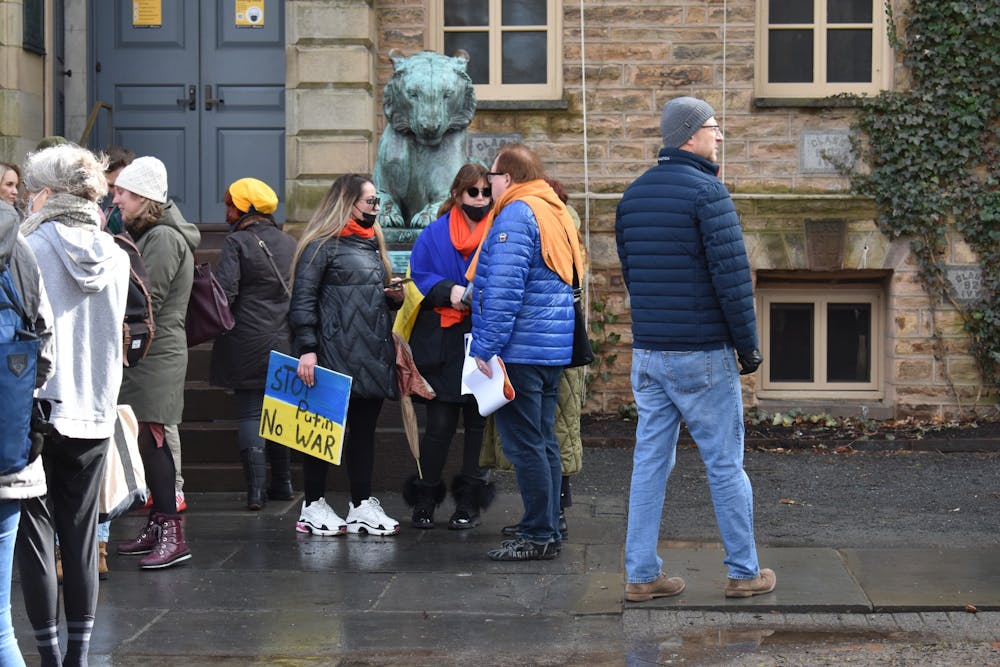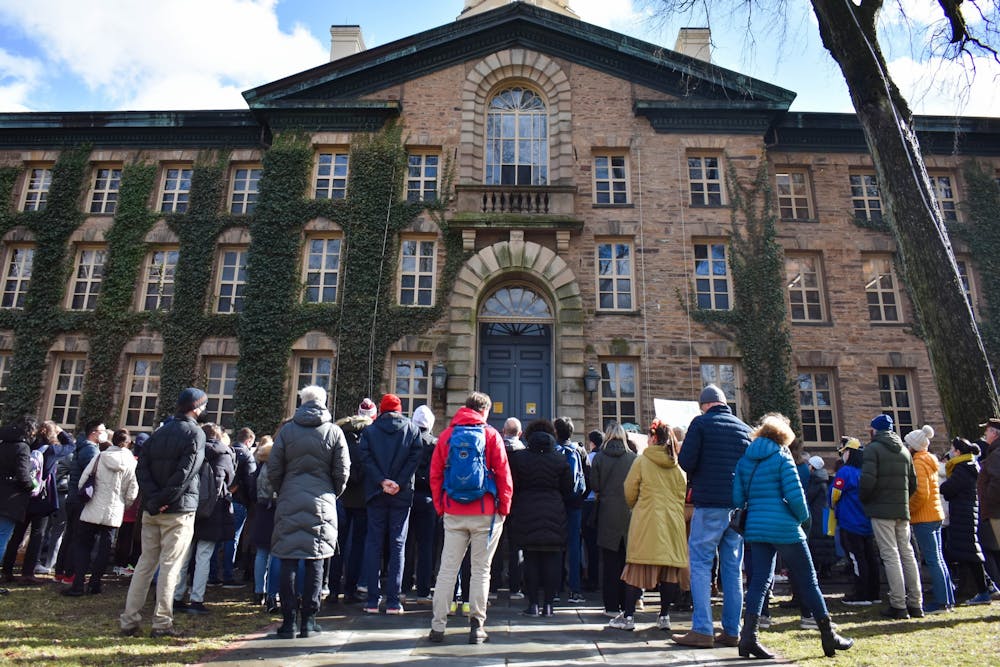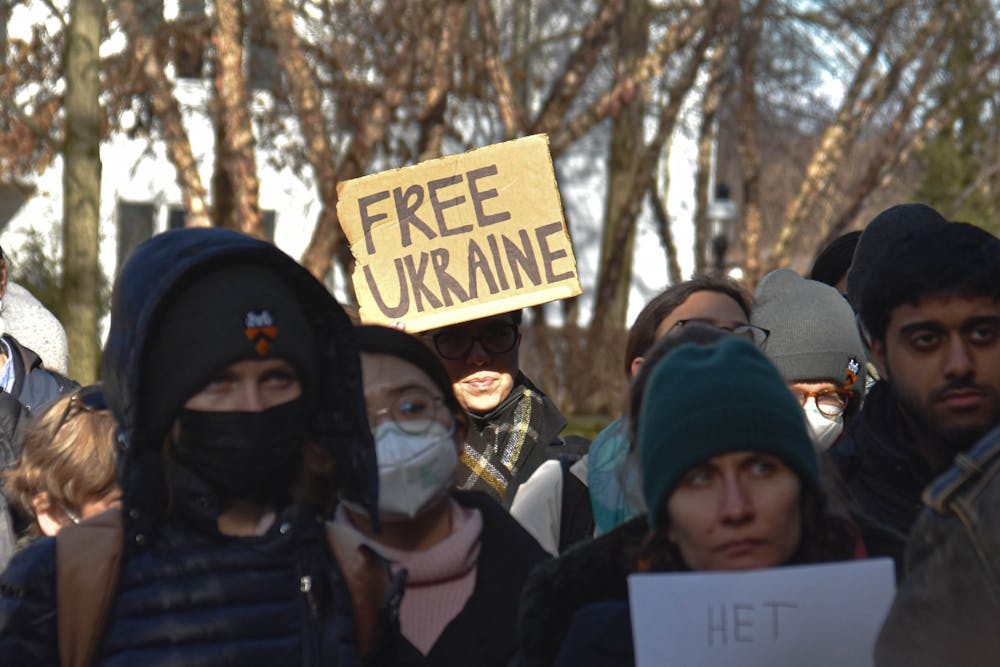On Friday, Feb. 25, a group of more than 100 Princeton undergraduates, graduate students, professors, and community members gathered in front of Nassau Hall to show their support of Ukraine amid the ongoing invasion by Russian troops. The event lasted for over an hour, with no University intervention.
The informal demonstration was organized chiefly by Professor Ekaterina Pravilova of the Department of History, who also serves as the acting director for the Program in Russian, East European, and Eurasian studies.
Pravilova spoke first from the steps of Nassau Hall. “I’m a historian. I study wars,” she told the gathering crowd. “I usually do not engage in public politics, but I have to — we have to do it now.”
She led the crowd in a chant of “no to war,” first in Russian, and then, with some assistance from Ukrainian students, in Ukrainian.
“This is what Russians are doing now in Moscow and St. Petersburg: they are saying no to war,” she added.

History professor Ekaterina Pravilova, one of the demonstration’s organizers, holds up a sign with the Ukrainian flag.
Mark Dodici / The Daily Princetonian
Protestors donned blue and yellow — the colors of the Ukrainian national flag — and held up signs with a wide-range of messages expressing support of Ukraine, including ones written in Russian and Ukrainian.

Multiple community members shared their own personal connections to the conflict.
Marta Baziuk ’24 shared with the crowd that while she attends school in the U.S., her family is in Ukraine. Her uncle lives close to Kyiv, “where the Russian soldiers entered and started shooting at civilians.”
“And I just want to say that our army isn’t staying silent, they are fighting against the Russians. Ukraine is fighting! We will not, we will not give up! Say no to war,” she said.
Pravilova comforted Baziuk publicly at the protest, telling her and the crowd that “this is a war not against Ukraine only, but against the Russian people as well.”

“We are crying with you,” Pravilova said. “It’s unbearable. I keep saying, ‘Can you forgive us?’”

One protester holds a sign colored as the Ukrainian national flag, reading “Stop Putin, No War.”
Isabel Richardson / The Daily Princetonian
Alisa Sopova GS, a Ukrainian Ph.D. candidate in the anthropology department, spoke next and shared that she has been keeping up with friends and relatives in her home country via a WhatsApp group. She noted that although it was her friend’s birthday, rather than spending the day preparing celebratory drinks, she was getting ready to defend herself.
“My best friend [is] actually making Molotov cocktails in her kitchen right now,” she told the crowd.
Professor Mark R. Beissinger, Henry W. Putnam Professor of Politics and an expert on post-Soviet states, came forward and asked for a moment of silence for “all the people who are dying in Ukraine right now, both Ukrainians and Russians.”
After the moment passed, Beissinger gave a brief background of Russia’s recent history with Ukraine, and then provided an assessment of the future of the conflict.
“Now, I don’t know what is going to stop Russia? There’s not much at this point in time, since the West decided it wasn’t going to intervene militarily,” he said. “They’ve used sanctions. But sanctions, ultimately, will not stop Russia in Ukraine. We have to try to deal with this as best we can and learn the lessons in some ways of what we’ve done.”
“In some ways, it’s not just a Ukrainian story, but it is a global story,” he continued. “It is a global story that’s unfolding before our eyes, one that unfortunately is costing a lot of people’s lives.”

Professor Mark Beissinger of the politics department spoke at the protest.
Mark Dodici / The Daily Princetonian
Sasha, a Ukrainian high school student studying at the Lawrenceville School, encouraged people to donate to military and humanitarian causes.
“I’ve heard a lot of speakers saying that they don't know what to do, or they feel helpless,” he said. “That’s definitely a feeling I share. But there are things you can do.”
Céleste Pagniello, a Canadian graduate student, invited people with knowledge of Russian or Ukrainian to speak with her about signing up to translate asylum documents.
“We are going to have so many refugees throughout Europe, and they’re going to need help,” she said.
In an interview with The Daily Princetonian after the demonstration, Pravilova reiterated her support for Ukraine. “I’m Russian, I’m from St. Petersburg, and I feel a deep responsibility and guilt,” she said. “It’s just this feeling of helplessness. And the only thing we can do is just bring people together and show solidarity with the Ukrainians.”
“I wish I could be in Moscow on the streets,” she added. “To really show to the government, to the state — although it would be much riskier and dangerous.”

Over 100 students, faculty, and community members joined the demonstration.
Mark Dodici / The Daily Princetonian
Hope Perry is the Head Podcast Editor at the ‘Prince’ who has covered USG, University COVID-19 policies, and US politics. She can be reached at hperry@princeton.edu or on Twitter @hopemperry.








